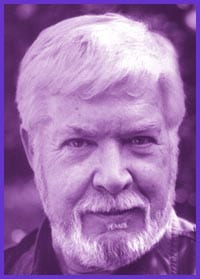He was cruised in Hollywood by John Wayne driving a blue convertible and threatened to be fed to the leather queens of Brighton by the tyrannical director Peter Brook. So you wouldn’t expect celebrated gay Canadian author Timothy Findley to flinch anymore from anything.
But he sometimes has cold forebodings as a writer. “It’s all a series of doors in a long hallway and you have to open them all,” says Findley. “There are some you don’t want to, because you’re afraid of what’s behind them. And once you’ve opened a door it becomes your responsibility to articulate what is behind that door. Therefore, you don’t.
“When you achieve my age, and can still put words on paper, you recognize that you have more and more of a responsibility to the integrity of everything you have done. You can’t turn away from it. I’m opening a lot of doors now – which a lot of other writers opened when they were in their 30s.”
One large door opens onto sexuality. Findley, age70, is at work on a novel set in 1998, a book, he confesses, that “scares the shit” out of him. “It is the whole interwoven world of men and women in all their sexual propensities. It’s set in the theatre world – which is another world I’ve been trying to articulate.”
One reason for his fear is AIDS, which struck down so many gifted artists. Findley has plenty of first hand experience with the plague, doing volunteer work at the Toronto AIDS hospice Casey House during the first two and a half years of its existence.
He and his longtime companion Bill Whitehead are modest about their generosity. “Thank God we had Stone Orchard,” says Findley of his former farm property outside of Toronto, “because we could take those who were able to come for weekends, swim in the pool, sit by the fire and do things they loved – and have lots of fun.”
Findley recalls being amazed at the men’s valour. “All these people lived out there in the open and they died out there. They didn’t weep for themselves; they wept about each other.”
For a writer, everything connects. And for Findley, the connections extend to Elizabeth Rex, his new play premiering at Stratford on Thu, Jun 29. The production is directed by Martha Henry and stars Diane D’Aquila, Brent Carver and Peter Hutt. The piece, Findley’s fifth stage play, encompasses sexuality, disguise, death and integrity – the leitmotifs of Findley’s literary universe.
The two word title came as a sudden flash while Findley was on an airplane. He promptly scribbled them down on a cigarette package without knowing their implications. But consider them carefully: The Latin translates into English as Elizabeth the king.
Gender contradictions abound; Elizabeth I survived intense political intrigue by acting as a man – she referred to herself as “a prince of Europe.” So there was role-playing and disguise.
She was also an avid theatre fan. Indeed, on the very eve of her lover Essex’s execution, she commanded Shakespeare’s company (the Lord Chamberlain’s Men) to visit her at a small palace south of the Thames and stage a play in a barn to take her mind off Essex’s imminent death.
History doesn’t tell us what that play was, but Findley turns it into Much Ado About Nothing because the character of Beatrice, an early feminist, would certainly have appealed to the queen.
But could any boy actor really manage a mature, complex female role? Findley believes that Shakespeare must have had actors who passed – and passed well beyond boyhood – who could therefore undertake portrayals of Cleopatra, Lady Macbeth, mad Margaret, Rosalind and a host of other strong female leads. Findley invented one such actor in the character of New Lowenscroft (played by Carver), a Welshman dying of syphilis contracted from one of Elizabeth’s army captains.
Findley now had the possibility of a glorious, theatrical confrontation between the woman who had played the role of a man and the man who had always enacted the role of a woman. And the moment for such drama was occasioned by Elizabeth’s need to recapture her womanhood and Ned’s need to by manly in the face of his own impending death.
History provided Findley with one more twist: Shakespeare’s purported young patron and lover, the Earl of Southampton, was in the same prison with Essex, facing the same fate for his role in Essex’s rebellion. Ultimately, however, the play (really, a play within a play in true Elizabethan fashion) shows that what carries weight is integrity, far more than sexuality or politics.
“If you’re obedient to the play, itself, everything you write has its own integrity. What you have to do as the writer – this is where the work and sweat come into the job – is achieve that integrity by means of a unique articulation that it demands.” The particular articulation encompasses words, gestures and scene structure. That’s why it took four years and an inspiring workshop with director Paul Thompson before Elizabeth Rex reached its present form.
Findley is exhilarated that Carver and Henry are involved. “It goes beyond admiration. Watching Brent haul out all the possibilities [as Ned] – Diane is the same. And Martha just lets them. Today’s rehearsal may be totally unlike yesterday’s. It doesn’t matter. They’re finding the note, the way.”
Elizabeth Rex.
$60.50-$67.50.
Thu, Jun 29-Sep 30.
Patterson Theatre.
Stratford.
1-800-567-1600.

 Why you can trust Xtra
Why you can trust Xtra


